04.13.16
Posted in America, Europe, Law, Patents at 7:46 am by Dr. Roy Schestowitz
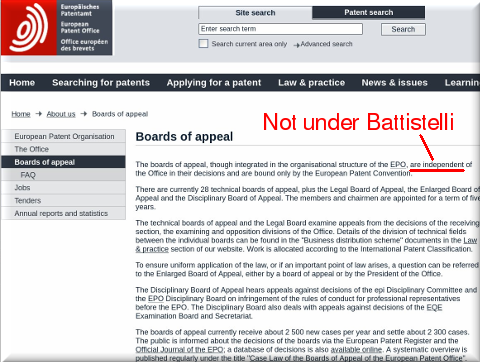
Summary: Two powerplays (or ‘Turf Wars’), one involving the scope/scale of patent aggressors being tackled and another involving justice versus greed (or so-called ‘production’)
THE latest bill (among several) which claims to be tackling the patent chaos in the United States was covered by the EFF the other day. To quote: “The Trade Protection Not Troll Protection Act is the newest of several patent reform bills introduced in Congress this session. Introduced by Reps. Tony Cardenaz (D-CA) and Blake Farenthold (R-TX), H.R. 4829 addresses patent litigation’s lesser known forum, the United States International Trade Commission (ITC), a federal agency that investigates unfair trade practices.”
They are still dodging reform revolving around patent scope, neglecting to see (maybe not deliberately) that many patent trolls rely on software patents. As many as three quarters of them attack legitimate companies using software patents, which means that eliminating software patents would almost eliminate the trolls (among other patent aggressors). Companies such as Microsoft and IBM want politicians distracted by and thus obsessed with “trolls”, hence leaving the large patent aggressors (hardly any different from trolls) untouched.
“As many as three quarters of them attack legitimate companies using software patents, which means that eliminating software patents would almost eliminate the trolls (among other patent aggressors).”Alice has changed a lot since the SCOTUS ruling on the case. Software patents should nowadays be assumed invalid until/unless proven otherwise by something not as corruptible as a for-profit system (patent laywers or patent offices) but a pro-justice system (courts and TTAB or PTAB [1, 2]). We were reminded of that in light of this new post euphemistically titled “Presumption Against Improper Inventorship”. “Here,” says Patently-O, “the Federal Circuit reviewed the evidence presented and agreed that it was ambiguous at best. As such it was insufficient to overcome the ‘heavy burden.’”
What we have here is justice (courts) versus a production line (the greed-motivated USPTO). Another Patently-O post was titled “Battles between the PTO and Courts” (regarding the USPTO, as it relates to trademarks as well). To quote: “Back in the district court, Alabama then asked for and received a new order from the district court judge — this time expressly ordering the USPTO to vacate its prior determination. The court wrote: “In June 2015, the TTAB essentially (and inexplicably) treated the court’s Order as a request, and issued a decision refusing to comply with this court’s Order.””
What’s noteworthy here is the divergence or the difference between a court’s position and the position of those who profit from just accepting everything (rejections discourage further applications or high application frequency). In the case of the EPO, for instance, Battistelli hates judges so much that he illegally banned one of them from going to work (an act legalised by the clueless Battistelli only after the act) and now threatens to eliminate the boards. They stand in the way of his “production” propaganda [1, 2, 3] because they keep highlighting errors and intimidate potential applicants (by simply doing their job, which is assuring patent quality). █
Permalink
 Send this to a friend
Send this to a friend
Posted in America, Australia, Deception, Europe, Law, Patents at 7:12 am by Dr. Roy Schestowitz
 Summary: The media continues to be dominated by patent lawyers rather than software developers who speak about (and promote in the case of lawyers) software patents
Summary: The media continues to be dominated by patent lawyers rather than software developers who speak about (and promote in the case of lawyers) software patents
PATENT lawyers who lack any practical experience with software don't seem to grasp the fundamentals of computer science. The same goes for patent judges. So why is it them who are perpetually trying to come up with policy on software patents, e.g. in India? See what IAM has just done. This week we still find patent lawyers giving “Hope” for software patents in Australia (Jack Redfern and Matthew Ward from Shelston IP Pty Ltd). These articles are composed and published by patent lawyers, unlike software developers — those who are actually affected by such patents. Who’s calling the shots here? Australian developers were already asked about this a few years ago and they overwhelmingly voted against software patents (it’s the same as in other countries).
“These articles are composed and published by patent lawyers, unlike software developers — those who are actually affected by such patents.”Last night we also found new patent propaganda from Marks & Clerk (they're some of the worst) and from Steve Lundberg (Schwegman Lundberg & Woessner, P.A.), whom we mentioned here some days ago because of his latest intervention. He is a patent propagandist (for many years now) and he leans on IBM now for his lobbying (he has a site dedicated to software patents advocacy).
“When will the USPTO be held accountable for it and when will software developers rise up to confront patent lawyers over their lobbying for software patents?”What’s wrong with patent lawyers lobbying on software patents is that they, unlike software developers, are leeches that only ever tax software. Lundberg uses (or misuses) words like “giveaway” despite the fact that he never gave anything and he is not even a software developer at all. If he actually asked developers, he would know that he works against their interests.
Courts have just (once again) shot down software patents which the examiners employed by USPTO granted erroneously. Nobody won here except patent lawyers, as usual. Both sides lost (financial casualties can be laid off staff) and the equivalent of weapons traders, patent lawyers, got a lot of money throughout an entire year of litigation. When will the USPTO be held accountable for it and when will software developers rise up to confront patent lawyers over their lobbying for software patents? Watch what lobbyist David Kappos is doing right now in the United States. It’s despicable. Remember who pays him for this.
“If software developers fail to exercise their freedom of speech and right to contact elected politicians, software patents in Europe will continue to be a growing problem.”It’s not a problem only in the US but increasingly in Europe (where Marks & Clerk, for example, comes from, just like IAM). One reader from Finland told us today. “One of the state’s ministers was on the radio yesterday going on about patents and “innovation”. I’m not able to find a transcript in any language. If you have other contacts in Finland, they might be able to provide some more information. From the press releases, I gather that they are going to say that they are promoting small businesses and that it will have something to do with patents, but I worry that the intent is to spread software patents. But again, I have no transcript.”
It is likely that such ministers are themselves lawyers and are lobbied by patent lawyers and their largest clients (large companies like Nokia or Microsoft). If software developers fail to exercise their freedom of speech and right to contact elected politicians, software patents in Europe will continue to be a growing problem. █
Permalink
 Send this to a friend
Send this to a friend
Posted in America, Patents at 6:30 am by Dr. Roy Schestowitz
Or why the Benson case shows misunderstanding of how computers work
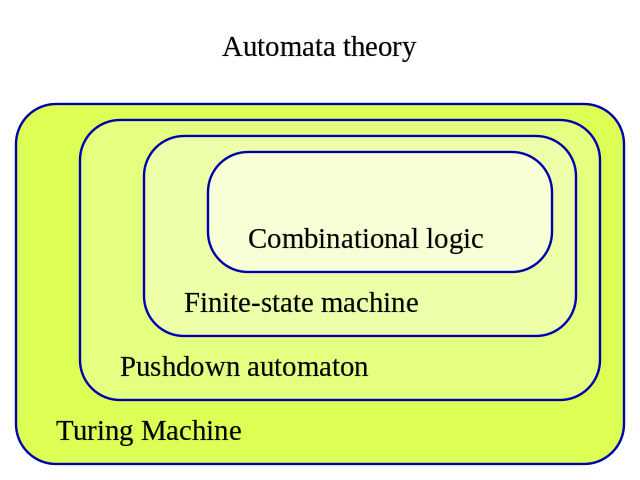
Reference: Finite-state machine
Summary: Remarks on the technical details or nature of software patents and why they are — contrary to some dull-witted claims — always reducible to analysis done by a human (mental process of logic and/or arithmetic)
THE notion (or rationale) of software patents is based on the misguided idea that rather than let people acquire a monopoly on a particular implementation using a particular computer language we should give people a monopoly on some vague series of instructions (very broad, not even pseudo-code), irrespective of implementation details, and that this way developers would have a greater incentive to write more code and better code. In practice, however, people who write computer programs already have a sort of monopoly on their own implementation because when they write code it is automatically copyrighted and unless the underlying code is hidden away in binary form, it is not so incredibly hard to enforce these monopoly rights. When it comes to patents, the monopoly’s scope is so broad (and the covered idea is so vague) that virtually any computer program, even if developed independently (neither mimicking anything nor relying on patent surveys), is infringing. For instance, a computer program with something resembling an hourglass can be deemed infringing, no matter the visualisation of the time indicator, e.g. progress bar (or equivalent). Developers thus need to start worrying about any such mechanism which is indicative of progress/latency.
“A human undertaking the task of sorting book on a shelf alphabetically by title knows that she is dealing with books, that the sequence of words on the binding are titles, and that words are composed of letters, and so forth.”
–Robert SachsSpeaking of software patents, Robert Sachs of Bilski Blog has just released the next (third) part of his long paper about software patents being metaphors (abstract) and he notes: “Another key difference between how computers perform their operations and how humans do is that humans, but not computers, understand what they are doing, and the meaning of their operations. A human undertaking the task of sorting book on a shelf alphabetically by title knows that she is dealing with books, that the sequence of words on the binding are titles, and that words are composed of letters, and so forth. She performs these operations directly on the words. This knowledge of the domain impacts how the operations themselves are performed. A computer can sort the same titles, but only once each title is represented as a string of numbers—the computer does not “know” that the numbers represent a book title any more than the human’s finger “knows” she is moving a book, and cannot use this knowledge to change the manner of sorting.”
Sorting algorithms are classic logical operations that are typically taught in the first year of computer science courses. Should they too be patentable? Where does it end? They don’t even do anything that wasn’t already done before (by humans, by hand). The fourth part of the series, published earlier today, cites the Benson case and states: “The court offers two further insightful observations. First, “Pencil-and-paper analysis can mislead courts into ignoring a key fact: although a computer performs the same math as a human, a human cannot always achieve the same results as a computer.””
“These are all reducible to a Turing machine and every pertinent operation can be carried out by a human rather than a processor, no matter the complexity (e.g. number of bits in the ‘pipe’).”The paragraph goes on with quotes like that, but it does not change the fact that any computation carried out by a computer can also be done on paper (it’s just a question of how long it takes for the human operator to do so). These are all reducible to a Turing machine and every pertinent operation can be carried out by a human rather than a processor, no matter the complexity (e.g. number of bits in the ‘pipe’).
There is still one more part (the finale) to come from Mr. Sachs. It’s part of a long paper on the subject of software patents (not a paper from software patents lobbyists like David Kappos, now funded by Microsoft and others to shame and pressure the system). █
Permalink
 Send this to a friend
Send this to a friend
Posted in Europe, Patents at 5:49 am by Dr. Roy Schestowitz
Vilifying the messengers
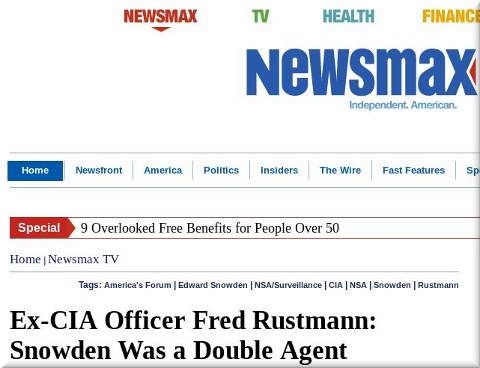
How Republican media sometimes covers Snowden revelations
Summary: A look at personal attacks, character assassination and discreditisation of people whose words challenge tactics of oppression, domination, and mass deception
In part one and part two of this series (there is more to come) we looked at methods by which Mr. Battistelli essentially engineered his EPO autocracy, having eliminated oversight several years ago and recently launched union-busting operations. It didn’t emanate/come out from vacuum and it wasn’t the fault of the EPC. There were just some loopholes/flaws in it and Battistelli was quick to exploit them over the years, in spite of warning from the unions (they spoke and published interviews with those affected). Nowadays, unlike decades ago, the EPO is known to many as an autocracy and a source of great shame to Europe (the EPO used to be a source of pride and pillar of innovation). Board 28, which is meeting secretly/privately today, recognises this and a staff survey shows that it's taking its toll on workers, leading to brain drain [1, 2, 3, 4] and massive strikes (thousands of workers legally absent and lawfully making statements against the Office’s lawlessness).
Earlier this year we showed how Battistelli brought things down to an all-time low by comparing truth-tellers to Nazis and criminals. We made a local copy of the video/audio to serve as proof that cannot be squashed with copyright claims.
Incidentally, a few days ago someone sent us the following text regarding Battistelli’s potentially libelous claims about people whom he is crushing (because they say the truth about him and his goons):
Lies, damn Lies!
On 1 March Mr Battistelli appeared in front of the French National Assembly to answer questions concerning the social unrest in the EPO. Mr Battistelli presented the audience with half-truths and several complete and utter lies. The full hearing was broadcasted and a full transcript was provided so that this time Mr Battistelli cannot claim that he was misquoted or misunderstood. The kind of misinformation we have witnessed in this hearing is nothing new for the staff representation. This has become the trademark of Mr Battistelli and of his team. Bending long established rules of law, inventing new ones that suit them or ignoring all the rules altogether while asking everyone else to follow the rules has become the normal way of functioning of this administration.
This Organisation should not be led someone who cannot distinguish between truth and untruth, someone who sees conspiracies everywhere (even by the Board 28, someone who has shown that he is not here to serve the European public pub only himself.
Mr Battistelli is so out of touch with reality, that is not fit to lead a team of boy scouts, let alone an international organisation.
Well, Board 28 (B28) is meeting today, so it might also appreciate this bit of humour:
Another conspiracy.
The claims of the Board 28 in their request to Mr Battistelli are very similar to the claims raised by staff in their spontaneous petition for strike. This seemed surprising. We investigated the matter and came to the same conclusion as Mr. Battistelli: there must be a plot. The spontaneous petition from the staff is not so spontaneous after all. The petition was in fact started by the Board 28. The reason is obvious. After being ignored for years, even the B28 now wants a strike.
If B28 wishes to prevent further strikes, then maybe it’s a good idea to start with an analysis and explanation (to Battistelli at least, despite his lack of comprehension of reality) of why Battistelli is still in power and why he has managed to surround himself only with people blindly loyal to him. As long as this nepotist reign persists, it is guaranteed that the Office will continue to lose some of its best patent examiners. It is already losing some of the bravest ones — those whose adherence to truth has cost them their jobs. B28 ought to work hard to restore their jobs and re-integrate them into the workforce.
We invite readers to send us any information they may have (or will have) about the dialogue at today’s B28 meeting. █
Permalink
 Send this to a friend
Send this to a friend
04.12.16
Posted in Europe, Patents at 11:48 am by Dr. Roy Schestowitz
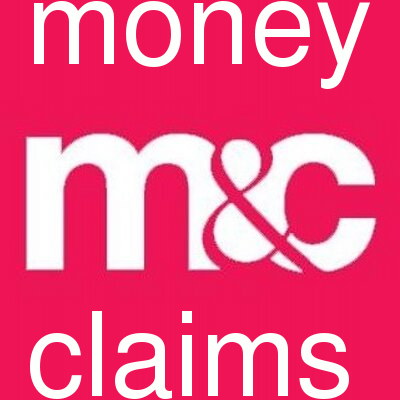
Summary: A look at the actors in Europe who are pushing for more patents in more domains (patent maximalism or overpatenting) because it serves their bottom line at the expense of everybody else
SOFTWARE patents, as we pointed out in our previous post, are a dying breed in the US, even if the USPTO continues to grant them (only to see them invalidated in the courts or at PTAB [1, 2]). What good is a patent if it’s unenforceable in a court of law? It’s just a waste of time, money, and effort. Why even bother with software patent applications? Incidentally, the Jerusalem Post now notes that people question China’s patent system (it too is a waste of time/money, unless one asks the author who is from a “Strategic Patent Department”, i.e. non-producing parasite) because just like the USPTO, it has virtually no quality control. The same goes for invalid/ated (by the European courts) software patents in the EPO. Who would still promote software patents in Europe? Surely the non-producing parasites that are based in Europe. Marks & Clerk, as we noted here before, is one of the boosters of the UPC alongside other greedy opportunists who don't care about innovation, only about lawsuits (money to them, irrespective of the outcome). Unsurprisingly, they also promote software patents, which the UPC helps bolster. Last night we noticed/found new promotion of software patents in British media (despite software patents being patent-ineligible here). Who wrote it? “Graham McGlashan is a chartered and European patent attorney at Marks & Clerk” (well, that explains it, doesn’t it?). Imagine the British media giving the microphone/platform (exclusive columns without response/balance) to a British drone engines company regarding reconnaissance and political assassinations abroad. It makes no sense, or does it? It really says a lot about the media.
“Imagine the British media giving the microphone/platform (exclusive columns without response/balance) to a British drone engines company regarding reconnaissance and political assassinations abroad.”Marks & Clerk seems to be unaware of the effective ban on software patents in Europe and appeals to loopholes. It says: “Patents can provide useful protection for technical concepts. Many computer implemented inventions have been patented in the US, UK and Europe. Confusion arises because the criteria for patentability of computer implemented inventions vary between jurisdictions.
“The European Patent Office (EPO) has a test in which claimed subject matter that is novel and inventive is potentially patentable if it has a technical character. A computer program itself can potentially be patented at the EPO if it is capable of bringing about, when running on a computer, a further technical effect going beyond the “normal” physical interactions between the program and the computer on which it is run.”
That’s the “as such” loophole created by a Brit, Alison Brimelow. What’s perhaps most ludicrous about this piece from Marks & Clerk is the headline. It says: “When you write great software, don’t forget patenting” (patenting software? In Europe?!)
“Marks & Clerk doesn’t care about what’s true and what’s good for the EU (or the UK); it just cares about winning cases and doing whatever helps its own bottom line.”Well, remember that one’s “great software” can then get one sued by other companies with software patents. It’s the M.A.D. mentality, which purports that lots of countries having nuclear weapons somehow makes us all safer.
What we find disturbing about Marks & Clerk is that it keeps funding UPC propaganda events and various events that promote software patents. It’s basically an echo chamber of patent profiteers. As one tweet put it this week in relation to TTIP: “The European Business Summit : where Businessmen (paying 600€ entrance fee) meet policymakers to shape your future” (staging a coup over politics and law while denying opponents of the coup any access). It’s more or less the same with UPC events (which are often even a lot more expensive to attend). If we continue to allow the likes of Bristows and Marks & Clerk decide on European law, we’ll all suffer in the long run. Marks & Clerk doesn’t care about what’s true and what’s good for the EU (or the UK); it just cares about winning cases and doing whatever helps its own bottom line. This is bad advice regarding software patents, but it’s good advice for Marks & Clerk’s own accounting. It’s just a British company with a Microsoft-powered Web site (which is rare nowadays) and what it does negatively affects software developers in Britain and abroad. █
Permalink
 Send this to a friend
Send this to a friend
Posted in GNU/Linux, IBM, Microsoft, Patents, Samsung at 10:58 am by Dr. Roy Schestowitz

Summary: Nearly two years after the historic Alice decision companies that rely a great deal on software patents (and patent royalties) are losing their prominence in the US patent system
According this new IAM report, Samsung is now number 1 in US patents (total). IBM is falling down the ladder rather quickly amid layoffs and it is worth mentioning that IBM is now a patent aggressor. It attacks legitimate companies, with software patents as a weapon [1, 2] (typical patent strategy of failing companies). Speaking of failing companies, Microsoft is at number 4 in its home country, having lost momentum not only as a company (now mostly a leech and patent parasite) but also as a patent applicant.
The good news about all this is that traditionally, as many sites correctly point out, Korean companies are not aggressive with patents. Samsung is no exception to this. Morever, Samsung is a producing company (hardware), so not so many of its patents pertain to software. Samsung uses a lot of Linux in its systems; in some cases it develops its own operating systems such as Bada or Tizen, rather than blindly rely on Android.
Another IAM report admits that it was wrong. It previously claimed that the patent troll of Ericsson was being renamed/reshaped again, but this turns out to be false. IAM then says that some people in Taiwan consider doing the same thing (creating a troll of their own, like Microsoft Licensing or Unwired Planet in the case of Ericsson), but it mostly quotes people who profit from litigation, not technologists. Well, that’s just IAM…
Looking at some more credible patents-centric sites, we quickly learn of more bubble-bursting in this area of patenting. “The decision by Judge Dyk and joined by Chief Judge Prost and Judge Taranto affirms a lower court’s dismissal on-the-pleadings of GTG’s patent infringement claim,” says Patently-O. “The holding is that the claimed method for analyzing DNA for linkage disequilibrium is ineligible for as effectively claiming a law of nature. The basic idea stems from the inventors discovery that coding regions (exons) typically correlate with “linked” certain non-coding regions (introns). [...] GTG is an Australian company that had previously sued a few dozen companies for infringing the ‘179 patent. The claims have been reexamined (at Merial’s request) and patentability confirmed.”
Nowadays, software patents aren’t quite as potent as before (in US courts/PTAB) and it shows. We hope that the coming few years’ decisions will send out the signal that there’s little incentive to software patenting, irrespective of USPTO lenience. █
Permalink
 Send this to a friend
Send this to a friend
Posted in Europe, Patents at 7:50 am by Dr. Roy Schestowitz
English/Original
Article as ODF
Publicadoen Europa, Patentes at 3:51 pm Por el Dr. Roy Schestowitz
Tanto abuso gerencial que las cortes estan simplemente abrumadas
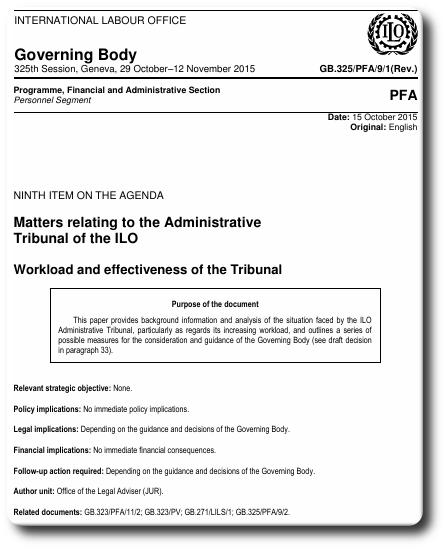
Reportaje completo aqui
Sumario: Como el torrente de quejas contra la EPO en la Organización Internacional del Trabajo (ILO) básicamente ahoga al tribunal y asegura que los empleados de la EPO no esperen justicia, al menos no por muchos años por venir
CUANDO el monarca en jefe de la EPO, Sr. Battistelli, despide a los representantes de los empleados (porque piensa que le gusta) pretende que tienen un proceso (jurídico) en que basarse, incluso si la ILO toma muchos años en tomar casos (la gente debe buscar empleo alternativo en el interim) y los resultados son desánimadoramente decepciónantes.
En la primera parte nos fijamos en algunos de los mecanismos que el propio Battistelli creó para los despidos, utilizando todo tipo de criterios vagos (como ser percibido como desleales o no lo suficientemente educado para cada miembro del personal). texto reciente que nos alcanzó explica por qué la ILO es incapaz de controlar a la monarquía fuera-de-control de Battistelli:
¿Desestimará la ILO a la EPO?
Los desarrollos actuales en la ILO-AT son otra amenaza a la inmunidad de la OEP. La gran mayoría de las quejas presentadas por el personal en contra de su empleador se pierden. Tal vez esto no debería ser una sorpresa, dado que los jueces del Tribunal se pagan sobre una base de caso por caso por la organización demandada. Parecería que la ILO-AT y la OEP son un matrimonio hecho en el cielo. Curiosamente, sin embargo, el Tribunal no parece estar contento con la EPO. Se ha publicado recientemente un documento en el que el Tribunal culpa a la EPO por sus retrasos cada vez mayores. Está claro que los mecanismos de resolución de conflictos internos de la EPO se han vuelto cada vez más disfuncional, véase, por ejemplo CA / 21/15, que señala 13-15 y 59-64 que muestran una extremadamente pequeña tasa de éxito. Sin embargo, al hacerlo, el Tribunal pasa en silencio sobre los cambios en su jurisprudencia que contribuyen fuertemente a su cartera de pedidos como exigiendo que cada miembro del personal que se ve afectada negativamente por una decisión general presentar su propia queja individual en lugar de aceptar una queja para todos. La falta de consistencia y una tendencia a descartar los casos en cuestiones de procedimiento en lugar de decidir sobre la sustancia más crear más inseguridad jurídica y contribuir a un aumento en el número de recursos. En una propuesta de modificación de sus Estatutos, que se presentará al Consejo de Administración de la ILO en junio, el Tribunal ahora planea retirar su aceptación para las organizaciones cuando encuentra que su
mecanismos internos de resolución de conflictos son insuficientes. No sólo eso: también tiene previsto que cree la autoridad para expulsar a las organizaciones existentes “cliente” que no cumplen sus condiciones. Parece claro que la EPO es primero en la fila. Si es así, la EPO será la primera organización en ser expulsada del Tribunal. Esto sería una gran vergüenza. La Organización se vería obligado a ofrecer una alternativa rápida, a menos que quiere ver a su inmunidad levantada por los tribunales nacionales para las que sería muy claro que el personal de la EPO ya no tienen acceso a la justicia. Dado que el acceso a la ILO-AT se fija en el EPC (artículo 13 del CPE), un cambio de este tipo requeriría una conferencia diplomática ..
En sumario lo de arriba sugiere que hay ataduras financieras entre la ILO y la EPO y no hay voluntad de justiica, simplemente la percepción. Y empeora:
Injusticia Sumaria
La EPO fue noticia al negarse a aceptar el fallo de un tribunal holandés de segunda instancia y anunciando – a través de un vicepresidente – que sería incluso ignorar el fallo del Tribunal Supremo holandés, que debe fallo no sea a su favor. Un desprecio similar se muestra por la OIT-AT en su sentencia de 3563, relativa a una solicitud de revisión de la anterior Sentencia 3297 (despido por acusación de fraude). El Tribunal confirmó el despido. Después de la sentencia anterior el autor fue absuelto de las mismas acusaciones por un tribunal penal holandés. Se pidió a la OIT-AT (un tribunal administrativo que se limita a los procedimientos escritos, sin una investigación y sin audiencias) que reconsidere su fallo a la luz de los hallazgos de la corte holandesa especializada (penal) que es mucho más profundo en su funcionamiento . El Tribunal consideró que las conclusiones de la corte holandesa eran irrelevantes y se negaron reconsiderar su posición. La solicitud de revisión fue sumariamente (sic) desestimó.
¿Cómo es esto justicia y cómo puede el Consejo administrativo esperar la percepción de justicia? El núcleo del asunto es, la gerencia de la EPO despide a la gente de manera injustificada, luego pretende que ellos pueden encontrar justicia en la ILO — algo que ellos claramente no pueden (abogados de la SUEPOreciéntemente hicieron constructivas sugestiones a Guy Ryder, Director General de la ILO), creciéntemente por el altísimo número de quejas. Mientras más abusivo los chacales de Battistelli se convierten, lo más encumbrados la ILO lo es y menos probable que los miembros despedidos encuéntren justicia alli. Algunos tirarán la toalla. Desesperanza y sensación de abandono se hán convertido en herramiénta de dominación y opresión. La atmósfera de temor tiene un efecto paralizante cuando no hay recursos a los principios naturales de justicia.
Permalink
 Send this to a friend
Send this to a friend
Posted in America, Europe, Patents at 7:41 am by Dr. Roy Schestowitz
English/Original
Article as ODF
Publicado en America, Europe, Patentes at 7:27 am por el Dr. Roy Schestowitz
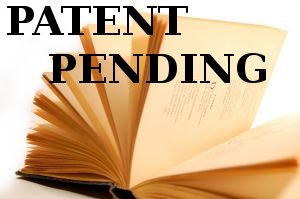
Sumario: Las patentes on triviáles/o abstractas ideas implementadas en código todavía son una barrera mayor para la adopción de Free/libre software (FOSS) y miramos quienes las están promoviéndo, conjuntamente con la UPC en elcaso de Europa
VARIAS oficinas de patentes, la EPO y la USPTO por ejemplo, tratán duramente de otorgar patentes de software, incluso bajo FOSS Fuerza tiene esta nueva interesante artículo, que necesitamos más. No hay muchos sitios de software libre se molestan discutiendo las patentes de software más (Groklaw ha estado inactivo durante años) y todavía lo consideran el # 1 sujeto cuando se trata de la dominación de software libre (no todo el mundo está de acuerdo con el nosotros), por lo tanto, lo cubrimos con tanta frecuencia.oposición de las cortes. Que les importa mientrase ellas sigan recibiéndo dinero y dejen que los acusados se las arreglén con el caos y sus honorarios legales (¿una externalidad a las oficinas de patentes?) El Presidente de la EPO no tiéne idea acerca de ello y el antiguo Director de la USPTO es ahora un cabildero por las patentes de sofware, las que son verboten en Europa. Que podrido estado de cosas. El problema principal es que los desarrolladores de Free/libre (más que desarrolladores de software propietario) tienen sus projectos cerrados (extinguídos) por las patentes de software. Esto sucede de una manera silenciosa frecuéntemente, por prospectivas demandas que las silencian o porque hay temor de retalación de parte del acusador (a veces un troll de patente s, otras una compañía real como Shazam [1, 2, 3]).
“El problema principal es que los desarrolladores de Free/libre (más que desarrolladores de software propietario) tienen sus projectos cerrados (extinguídos) por las patentes de software.”
FOSS Force tiene esta nuevo interesante artículo, del que necesitamos más. No muchos sitios de software libre se molestan más discutiendo las patentes de software (Groklaw ha estado inactivo durante años) y todavía se consideran el # 1 en la materia cuando se trata de la dominación de software libre (no todo el mundo está de acuerdo con el nosotros), por ello, lo cubrimos con tanta frecuencia.
“Noventa y nueve por ciento de los votos emitidos hasta ahora indica que nuestros lectores piensan que las patentes de software siguen siendo un problema serio, incluso si la situación ha mejorado duránte los últimos años.” – FOSS Force
“No hay duda,” FOSS Force escribió, “que ha habido muchos avances en el frente de patentes que han sido beneficiosos desde el punto de vista técnico gratuito. Hubo la sentencia del Tribunal Supremo del 2014 en Alice Corp. vs. CLS Bank, lo que hizo de inmediato una serie de patentes imposibles de cumplir. Esta decisión invalidó las denominadas patentes de software “abstracto”, que básicamente buscaban la protección de patentes por simplemente moviendo procedimientos establecidos anteriormente manualmente, a un ordenador (es decir, de contabilidad “a un ordenador”). Otros avances incluyen la decisión en le caso del vendedor online Newegg para tomar todas las reclamaciones de infracción de patentes de años atrás en disputa a la corte en lugar de ´arreglar´. Aunque los resultados de esta decisión han dado lugar a una mezcla de resultados, con notables victorias y derrotas, es, sin duda, hizo que los trolls lo piensen dos veces antes de amenazar la compañía.”
Aquí están los números basados en una nueva encuesta: “Pusimos la encuesta en nuestra página principal la mañana del Jueves.Noventa y nueve por ciento de los votos emitidos hasta ahora indica que nuestros lectores piensan que las patentes de software siguen siendo un problema serio, incluso si la situación ha mejorado duránte los últimos años.
Hay alguna percepción de que las cosas estan mejorando, pero ¿dónde? Talvez en los EE.UU., debido a Alice. Pero ¿qué acerca de Europa? Bristows LLP se encuentra actualmente promoviéndo a la UPC (y por extensión patentes de software) y uno de sus empleados, quién habitualmente las defiende, acaba de publicar un artículo acerca del proyecto de ley de los EE.UU. Que aboga ir contra los trolles de patentes (o la sede de los juicios de patentes), en lugar de la esfera de patentes, he aquí una distracción del problema principal.who habitually defends software patents, has just published an article about the US bill which advocates going after patent trolls (or patent lawsuit venue) instead of patent scope, hence somewhat of a distraction from the core problem. Para citar una porción:
Actualmente, titular de una patente puede iniciar una acción por violación de patente en cualquier distrito donde el demandado reside o hace negocios (es decir, donde están disponibles sus productos o servicios) (véase la decisión del Circuito Federal de 1994 en Beverly Hills Fan Company v Royal Sovereign) y VE Sosteniendo v Johnson gas (Fed Cir 1990). Las reglas han hecho posible que el Distrito Este de Texas, por ejemplo, para convertirse en tan popular (para una entretenida de 11 minutos, ver de John Oliver semana pasada Noche de Patentes). El objetivo de la Ley de VENUE es limitar la capacidad de los titulares de patentes a abusivamente tienda de foro (que puede ser interpretado como detener los trolls de patentes de la focalización de jueces amigables al titular de la patente). Una legislación similar fue introducida en la Ley de Innovación (H. R. 9 – véase también aquí), pero que se ha estancado (al igual que la Ley de Patentes compañero (S.1137) antes de que el Senado). Algunos comentaristas consideran que la Ley de VENUE es un intento de obtener algún tipo de reforma de las patentes a través del Congreso número 114 antes de todo el mundo pierde interés para la elección. Por dedicarse a un solo tema, en lugar de varios, esto puede aumentar sus posibilidades de éxito.
Esto pueda obstaculizar a los trolles (no completamente detener/aplastar sus extorsiónes/chantájes), peor aun no hace nada contra la esfera de patentes. Mientras tanto, temprano hoy IAM dijo “NPE” en vez de troll de patentes (si, de nuevo) en relación con el lejano Oriente. Para citar: “En Taiwan, las compañías están observando el ambiente en los EE.UU. Tan cerca que puedan – algunos de ellos han sido objetivos frecuentes de litigación de parte de los NPEs (leáse TROLLES). Ahora hay una cauta creencia que eso ya pasó y que la continua aserción de las NPEs continuará declinando. Hay evidencia que algunas compañías Taiwanesas perciben el riesgo de moverse a Europa, con entidades de la isla aumentando sus aplicaciones por patentes Europeas por un 12 % el año pasado. Muchos otros, sin embargo toman el aproche de espera-y-ve, por lo menos por el costo considerable envuelto en las aplicaciones Europeas. Con le tratado UPC en la balanza, esa precaución es buena.
Como recordatorio, he aquí el por qué no pueden decir “troll” y en lugar dicen NPE (eleditor en jefe niega el problema ya que los trolls son sus financistas). Seguro que parece a las empresas Asiáticas también están preocupados por los trolls de patentes de los Estados Unidos. Observe la parte al final acerca de la UPC, lo que abriría Europa para una gran cantidad de litigios por parte de los trolls de patentes (incluso desde el extranjero). No parece ser una causa de alarma entre los abogados de patentes, que simplemente ganarán con ello. Steve Lundberg, un fuerte defensor de las patentes de software desde hace muchos años, está feliz de ser bendecidos por IAM (otra voz alta de los proponentes de las patentes de software, vea la columna derecha de esta nueva entrada) y ahora acícala a Schecter de IBM (ahora un agresor con las patentes de software, como varias demandas recientes muestran), que esta evidentemente satisfecho con eso. Todos los grupos de presión, grupos de expertos, los expertos de patentes, etc., que muestran sin esfuerzo su fuerte sesgo en el tema no deben ser ignorados, ya que se benefician de ello y tratan de cambiar la percepción/consenso público. IAM es pagado por los agresores y los trolls (incluso los más grandes y notorios como MOSAID); que promueve una patentes de software en el tema deste mes de la revista. Lo mismo ocurre con la EPO (véase por ejemplo la propaganda UPC en la página 4 de esta publicación EPO anunciado recientemente); ¿cuándo la EPO dejará de actuar como un grupo de presión de la UPC, lo que ha hecho durante muchos años?
Avergonzar a aquellos que promueven las patentes de software sin haber escrito una sola línea de código en toda su vida no es ser confrontaciónal o grosero. Es necesario porque hay un golpe en marcha y menos que los desarrolladores de software (no necesariamente sólo FOSS) se levánten y luchen de nuevo se tendrá que pagar el precio en el largo plazo. Su dinero fluirá a los abogados de patentes, los trolls de patentes y monopolios de software.
Permalink
 Send this to a friend
Send this to a friend
« Previous Page — « Previous entries « Previous Page · Next Page » Next entries » — Next Page »


 Summary: The media continues to be dominated by patent lawyers rather than software developers who speak about (and promote in the case of lawyers) software patents
Summary: The media continues to be dominated by patent lawyers rather than software developers who speak about (and promote in the case of lawyers) software patents





















 Content is available under CC-BY-SA
Content is available under CC-BY-SA